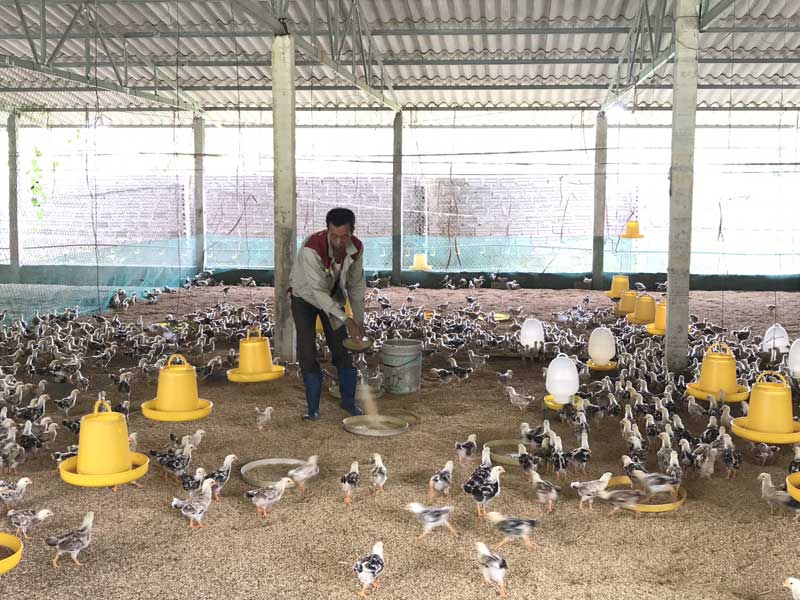
(HBO) - The farmers’ association of An Binh commune has promoted a production emulation campaign among its 1,583 members to raise locals’ engagement in technological application so as to enhance yield and production quality. Its chapters of different levels have regularly held meetings to review production conditions and put forth prompt solutions.
 A chicken-rearing
model of Nguyen Van Quy in Cay Ruong village, An Binh commune, Lac Thuy
district, reels in nearly 200 million VND in annual revenue.
A chicken-rearing
model of Nguyen Van Quy in Cay Ruong village, An Binh commune, Lac Thuy
district, reels in nearly 200 million VND in annual revenue.
As a result of the campaign, a number of members have
strived to gain millions of VND in annual revenue and create jobs. For example,
a plywood production workshop of Quach Van Du in Dai Dong village reels in 400 –
500 million VND a year and generates 30 jobs; and a farm raising 12,000 fowls
of Nguyen Van Long in Cay Ruong village with 200 million VND a year. The
members have also built exemplary orchards that push for economic development
and give the rural area a facelift.
The campaign has led to a reduction in the number of the poor
households among its members, with the figure currently recorded at 152 against
the 203 in 2019.
The total debts of its members are close to 10 billion VND
at the Vietnam Bank for Social Policies, and 67 billion VND at the Vietnam Bank
for Agriculture and Rural Development.
So far this year, the commune has recorded more than 185
billion VND worth of production value, up 7 percent year on year. The entire
commune has 235,000 fowls, 945 bee hives, and 1,280 goats, with local paddies
and citrus fruit plantations, among others, posting high yield.
The local annual per capita income hits 49 million VND and
its rate of poor households is at 7.1 percent./.
Dao Village’s honey – a product certified with a 3-star OCOP (One Commune One Product) rating by Thong Nhat Agricultural Cooperative in Dao Village (Hoa Binh City) – is highly regarded by consumers for its quality, richness, and variety in packaging. The distinctively sweet taste of Dao Village’s honey leaves a lasting impression on anyone who has tried it.
In alignment with Project No. 07-DA/TU, issued by the Hoa Binh provincial Party Committee on November 1, 2021, Lac Thuy district has actively promoted investment and supported the sustainable development of its industrial and handicraft sectors during the 2021–2025 period. Alongside this, the district has remained committed to preserving and revitalising traditional craft villages.
Located in the northern part of Lac Thuy district, with a temperate climate and fertile soil, Phu Thanh commune has great potential and advantages in growing tea. The long-standing experience, combined with strict adherence to organic farming practices in the tea gardens, ensures that the dried tea products from Phu Thanh and Lac Thuy as a whole are sold out immediately upon production, providing a stable and prosperous life for the local people.
Amid efforts to streamline the administrative apparatus, Hoa Binh province has intensified measures to address challenges in land clearance, resettlement support, and infrastructure investment, aiming to speed up the progress of key projects.
Hoa Binh province has posted an unprecedented economic growth rate of 12.76% in the first quarter of 2025, marking its highest quarterly performance to date and positioning it as the second fastest-growing locality in the country, trailing only Bac Giang province.
Under current regulations, products in the One Commune – One Product (OCOP) programme that are rated three stars or higher must undergo re-evaluation every three months. However, in reality, some of these products fail to consistently meet the required standards, raising concerns about the sustainability of their OCOP certification. This underscores the urgent need for producers to enhance product quality and gradually develop their OCOP products into strong, marketable brands.



 A chicken-rearing
model of Nguyen Van Quy in Cay Ruong village, An Binh commune, Lac Thuy
district, reels in nearly 200 million VND in annual revenue.
A chicken-rearing
model of Nguyen Van Quy in Cay Ruong village, An Binh commune, Lac Thuy
district, reels in nearly 200 million VND in annual revenue.